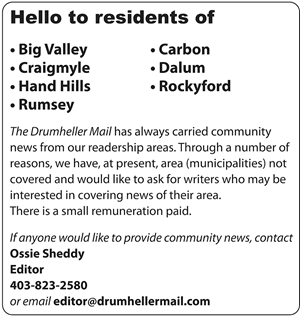
Trying to keep our carbon footprint minimal has not been an easy task for Tammi Nygaard, Operations Manager of the Drumheller and District Waste Management Association.
The operation is experiencing issues with plastic recycling. Plastics are sorted into different categories. Categories 1 through 7 are plastics such as fruit containers or margarine tubs. The number 2 category of plastics are sorted separately and are products such as milk jugs and hard plastics.
There is a market for number 2 plastics, as it is the highest quality of plastic. The issue begins with the 1 through 7 plastics. There is no market for those plastics in western Canada.
Drumheller and District Solid Waste Management has been shipping their plastic to the United States to be recycled, but at an excessive cost.
“It costs us 10 dollars a metric tonne to get rid of our plastics. It takes a lot to make a tonne because plastic is very light. There is no substance to it. It is not like cardboard that has some weight to it. We are having a really hard time trying to find markets closer to home so we don’t have to pay for the transport cost on top of that,” says Nygaard.
She mentions that the cost of transportation to get the plastic to the United States outweighs the amount of carbon footprint reduced by recycling.
“You have to look at how much you are saving economically, financially, and environmentally wise. We are taking this material, processing it, which means it has to be taken through a baler, which consumes energy, then put it on a truck and transport it hundreds of miles, sometimes even thousands of miles, to get it to where there is a market for it, and then have to pay another 70 to 110 dollars on top of it. It is really hard for us to do that. We have to consider the carbon footprint we are leaving behind to get it all there.”
Nygaard mentions there is a recycling plant in Medicine Hat that produces plastic lumber. Sending the plastic there decreases the charges of transport by being local, but the plant requires the number 2 category of plastics to be mixed in with the plastics being recycled.
“It must have the number 2 plastic mixed in with it. But I still have to pay them 40 to 60 dollars a tonne for them to take it and make plastic lumber. I have to sacrifice my good revenue source of number 2 plastic and still have to pay.”
Nygaard has been researching the best plan to have the plastic recycled with low cost.
“Ideally, having a local market, even in Saskatchewan, would reduce the cost enough that it wouldn’t be such a loss to us.”
“When I first started this, I thought I was going to change the world. I said ‘it doesn’t matter, we need to recycle everything we can,’ but you have to take into account the carbon footprint, the economics, and efficiency.”
Because of the lack of market, many recycling programs in Canada have been storing their plastics, trying to wait for a better option.
Nygaard has been hoping the Government of Alberta will put forward a plan to help with this issue.
“There is a number of plastic recycling companies around the province in the same boat. I am just waiting and hoping that the government is going to come up with a plan or program or even show some initiative. It has been on hold for the last few years by the provincial government.”
“Our provincial government has since been changed, but this stuff is just sitting here, it’s starting to become a fire hazard and decay. The plastic companies won’t accept the plastic if it is starting to decompose, so then we have to put it in a landfill anyway.”
Nygaard encourages the public to take action toward this cause.
“Write letters to your MLA and politicians, demanding, requesting, or asking that they come up with a paper and packaging protocol. If the government says you have to do it, then people will start bringing the business closer. Thousands of these plastics could be recycled but are waiting in storage because it is too much to spend,” urges Nygaard.
















